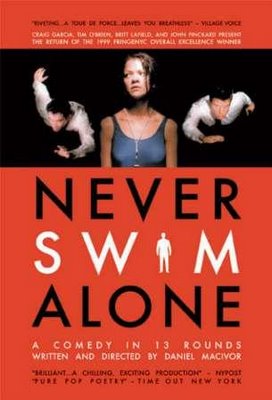 Reviewed by Aaron Riccio
Reviewed by Aaron RiccioBravo, Daniel MacIvor, and I don’t mean the military letter that comes after Alpha and before Charlie. Never Swim Alone is a technically perfect, dazzlingly verbal, low-budget show that solidifies the Fringe as a showcase of pure talent. While not a theatrically daring piece—it has a cast of three, no set, and two props—but by investing all of its energies in a story, a particularly moving story, it has all the thrills you expect of the theater.
Arguing in a stylishly clipped tone, together or overlapping, two men (Douglas Dickerman and John Maria) walk into a room. As the story goes, one is the first man, and the other has a gun. A woman (Susan Louise O’Connor) clad in a blue bathing suit that complements the two men’s suits (black suit, silk tie, black shoes, black socks), referees from a stool as the two men compete. Why they compete is not as important as the fact that neither of these friends wants to lose, and all that matters is that they'll unleash the playful banter of David Ives's All in the Timing or the furious sarcasm of David Rabe's Hurlyburly in order to get it. This passionate dexterity is enough to sell the show alone, but MacIvor's got a secret buried in all the semiotic dissections of character that make up his thirteen "rounds." There are these two men, sure, but there is also a beach, a bay, and a point, and that point is both a far-off place and the dramatic hook.
Never Swim Alone is about one-upmanship, but it’s also about the costs of such fixation, and as the insults grow more personal, MacIvor paints a perfect satire of the American workaholic. More so, he does it all with a few lighting cues and a few exceptional actors. The rightfully confident John Maria, who has been with this show since the original ’99 Fringe production, is joined by newcomer Douglas Dickerman (though by the chemistry, you’d swear he’s been with this show forever). Their interplay, like Tom Stoppard’s warped Rosencrantz and Guildenstern, leaps off the stage with personality. (O’Connor is fantastic too, commanding when she speaks, but this is a showcase for the swaggering male stereotype.) This is a well-oiled play: there’s no reason this couldn’t run off-off-Broadway forever, perhaps in repertoire with the similiarly themed Israel Horovitz play, Line.
Bravo, Mr. MacIvor. Bravo. And encore.



No comments:
Post a Comment